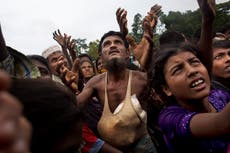Facebook shared information that could support Myanmar genocide allegations, UN investigator says
UNHCR’s Myanmar agency says its collated ‘three million information items from more than 200 sources’
The head of the United Nations Human Rights Council (UNHRC) investigations team in Myanmar said on Monday that Facebook has handed over millions of items that could support allegations of war crimes and genocide.
Nicholas Koumjian, head of the Independent Investigative Mechanism for Myanmar (IIMM), established by the UNHRC in 2018, said that Facebook had shared “millions of items from networks of accounts that were taken down by the company because they misrepresented their identity”.
Myanmar is facing allegations of genocide at the UN’s International Court of Justice (ICJ) over a 2017 military crackdown on the ethnic Rohingya population in Myanmar’s northern Rakhine State that forced more than 730,000 people to flee into neighbouring Bangladesh.
In 2018, UN human rights investigators accused Facebook of being the conduit for hate speech in Myanmar that had fueled violence against Rohingyas.
In November 2019, The Gambia – with the backing of the Organisation of Islamic Cooperation – filed a case before the ICJ that alleged Myanmar’s atrocities in Rakhine violated various provisions of the Convention on the Prevention and Punishment of the Crime of Genocide, also known as the Genocide Convention.
In 2021, Facebook, now called Meta, said it supported international efforts for accountability for the crimes committed against the Rohingya.
In the same year, Rohingya refugees in the US and UK sued Facebook for more than $150bn and accused it of allowing the spread of hate speech and dangerous misinformation against the community.
In a statement to Reuters, Miranda Sissons, director of human rights policy at Meta, said: “(We) have made voluntary, lawful disclosures to the UN’s investigative mechanism as well as disclosures of public information to The Gambia which has filed the ICJ genocide case.”
On Monday, IIMM head Mr Koumjian said: “Almost all [Rohingyas] remain in neighbouring countries awaiting the day when conditions will allow their safe and dignified return home. The end of impunity for those who inflicted the violence would do much to create such conditions.”
“The people of Myanmar continue to suffer because of the lack of accountability for those who believe they answer to no law,” he added.
The IIMM has prepared 67 evidential and analytical packages to share with judicial authorities, including for proceedings at the International Criminal Court and the International Court of Justice, the UNHCR said.
It added that “almost three million information items from more than 200 sources have so far been collected and processed”.
They include interview statements, documentation, videos, photographs, geospatial imagery and social media material, Mr Koumjian said.
“For example, Facebook has shared with the Mechanism millions of items from networks of accounts that were taken down by the company because they misrepresented their identity – the accounts were actually controlled by the Myanmar military,” he said.
Join our commenting forum
Join thought-provoking conversations, follow other Independent readers and see their replies
Comments





Bookmark popover
Removed from bookmarks